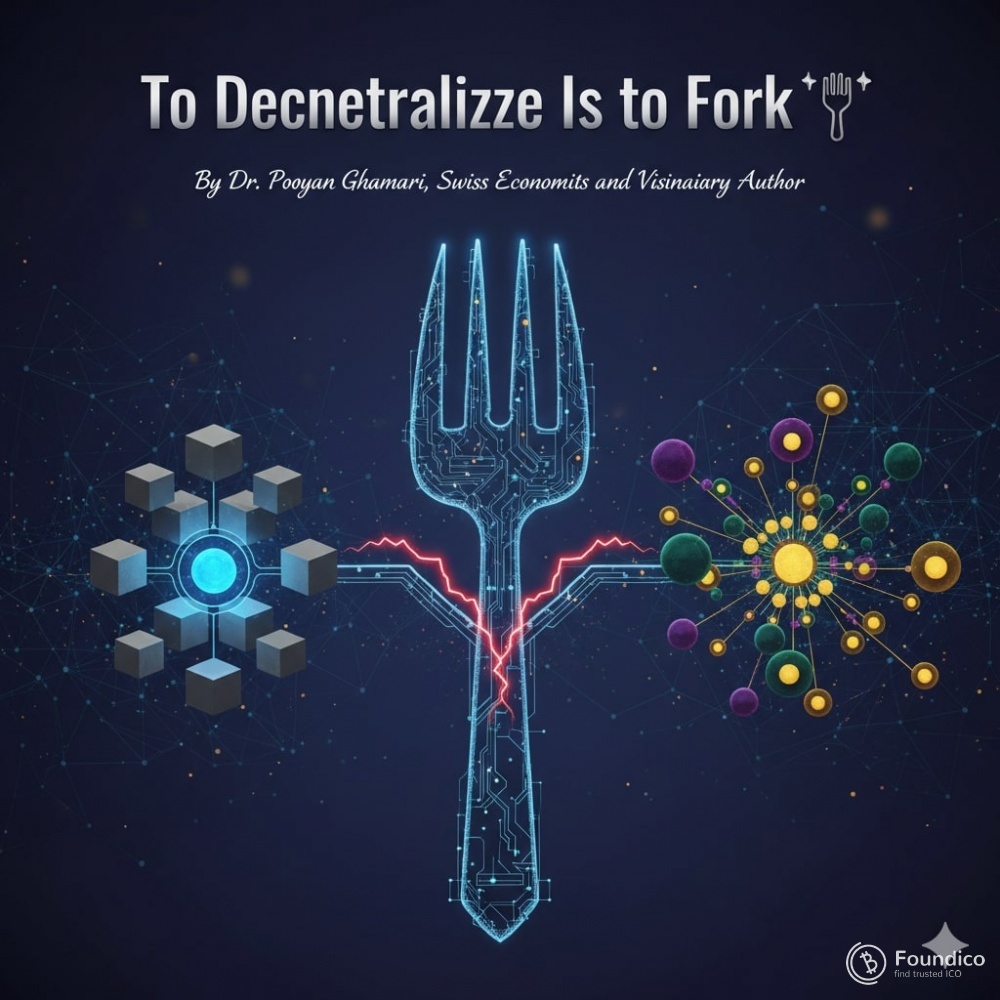By Dr. Pooyan Ghamari, Swiss Economist and Visionary Author
The concept of decentralization—moving away from a central point of control—is hailed as the defining paradigm shift of the digital age, particularly within the realms of technology, finance, and governance. Yet, the journey toward true decentralization is often misunderstood. It's not a seamless migration or a simple technical upgrade; it's a process intrinsically linked to the act of forking. To truly decentralize, one must be prepared to fork.
The Inevitable Split
In distributed systems, a fork refers to the creation of a new version of a software or protocol, splitting from the original. This split is more than just a code change; it represents a fundamental disagreement on the path forward, a schism in the community, and a tangible exercise of digital self-determination.
Centralized systems, by nature, maintain consistency and unity through the authority of a single entity. Everyone must adhere to the rules set by the center. Decentralized systems, however, are built on the voluntary consensus of independent participants. When that consensus breaks down—whether over a bug fix, an ethical choice, or a major change in economic policy—the only way for dissenting groups to preserve their vision and autonomy is to separate.
A Mechanism for Liberty
The very act of forking is a powerful mechanism of liberty and a safeguard against tyranny, even in digital form. If a central authority (or even a dominant faction within a decentralized system) attempts to impose rules that the minority finds unacceptable, the minority does not have to submit. Instead, they can "vote with their code" and clone the system, implementing their desired changes on a new, separate ledger or protocol.
This is the ultimate check and balance in a decentralized world. It prevents any single group from gaining permanent, unquestioned control. Knowing that a fork is possible acts as a disciplinary force, encouraging all stakeholders to remain transparent, responsive, and reasonable in their decisions. The threat of fragmentation forces humility upon those with power.
Decentralization as an Evolutionary Process
Therefore, decentralization should not be viewed as a fixed, stable state, but rather as an ongoing evolutionary process driven by continuous differentiation. The most vibrant decentralized ecosystems are often those that have experienced and survived forks, as these events validate the system's core principle: freedom of exit.
A fork tests a system’s resilience, loyalty, and economic viability. The community, developers, and capital must decide which path to support. This struggle for adoption refines the system, ensures that the most robust and widely desired version prevails, and confirms that the decision-making power truly rests with the dispersed collective, not a single hub.
To embrace true decentralization is to accept that disagreement is inevitable and that forking is the legitimate, and perhaps only, non-violent means of resolving fundamental conflicts. To decentralize is to fork—it is the signature of a system that cannot be held hostage. It is the cost of digital freedom.

 Snorter - Snorter Bot ($SNORT) is a Telegram-native, meme-fueled trading terminal for Solana and beyond. Built for speed, stealth, and degen-level execution, Snorter lets you swap, snipe, and copy-trade straight from chat. Powered by the $SNORT token, it's the fastest way to hunt launches, dodge rugs, and flip your way to the top before anyone else even loads the chart.
Snorter - Snorter Bot ($SNORT) is a Telegram-native, meme-fueled trading terminal for Solana and beyond. Built for speed, stealth, and degen-level execution, Snorter lets you swap, snipe, and copy-trade straight from chat. Powered by the $SNORT token, it's the fastest way to hunt launches, dodge rugs, and flip your way to the top before anyone else even loads the chart.